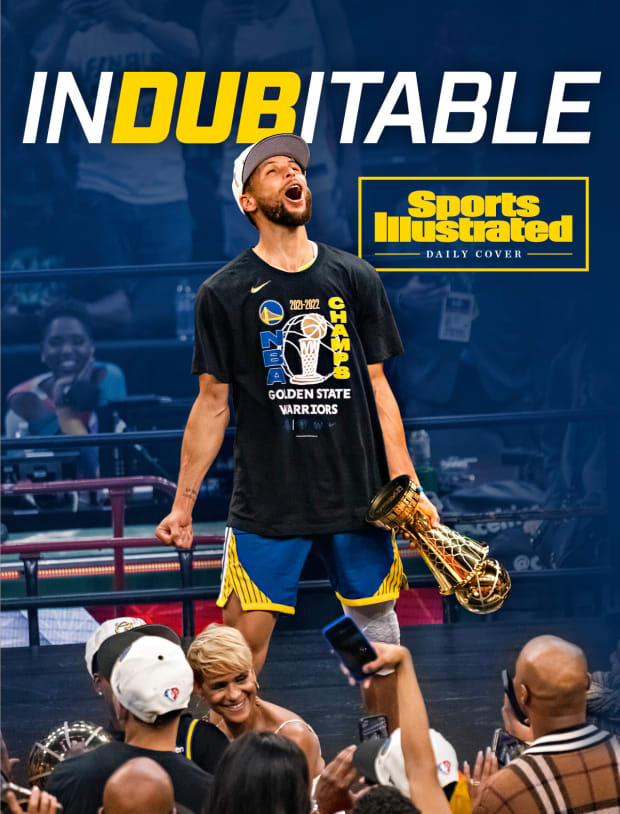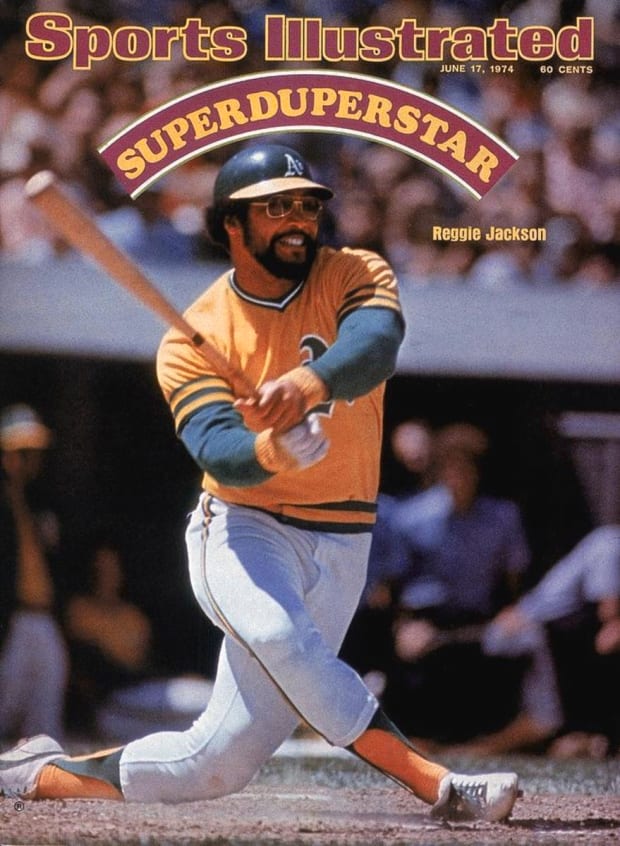Good morning, I’m Kevin Sweeney. We have a new NBA champion and a new Drake album.
In today’s SI:AM:
🏆 The Warriors are back on top
👑 Why this title is Steph’s crowning achievement
⛳ Rory starts strong at the U.S. Open
Curry, Warriors Grab a Piece of History
Stephen Curry and the Warriors are champions again.
A dynasty derailed by injuries and free-agency departures, it felt at one point as though the Warriors’ championship window had closed. Yet when the dust settled in Boston on Thursday night, it was Golden State back on top, champions of the world, completing a multiyear process that saw the Warriors retool, deal with devastating injuries and reimagine themselves as champions again.
Golden State’s first three titles were, for better or worse, labeled as great team accomplishments. Curry, Draymond Green, Klay Thompson and eventually Kevin Durant became the new face of superteams in the NBA, and Steph’s lack of a Finals MVP honor from those first three championships is as good an illustration of that as anything. As Howard Beck wrote, “If the 2015 run was, as the Warriors framed it, a “Strength in Numbers” campaign, and the ’17 and ’18 titles were stamped by Kevin Durant, then this one was clearly, indisputably Curry’s.”
This was Curry’s chance to be the star. And boy, did he ever show up. Sure, he was quiet in a critical Game 5 win, scoring just 16 points and failing to make a three. But Curry’s 43 points in Game 4 to tie the series at two games apiece felt like the defining moment of the playoffs, and his 34 points, 7 rebounds and 7 assists Thursday night sealed the title in enemy territory in Boston.
Of course, Steph didn’t do it alone. The Dubs got 15 points in 18 minutes from Jordan Poole off the bench, the culmination of a breakout playoffs for the former Michigan star. Green, oft-criticized for his play in the series, flirted with a triple double in 42 minutes of action and even knocked down a pair of threes to silence the Boston crowd. And after being perhaps the biggest key for the Warriors throughout the postseason, Andrew Wiggins hit four threes and played a team-high 44 minutes.
Still, when the Warriors needed to hold off the hard-charging Celtics on Thursday night, it was Steph who made the biggest plays. He drilled deep threes early to stretch the Golden State lead to more than 20 and made crafty plays in ball screens when the Celtics made pushes late to try to get back in it. It’s a crowning achievement in Curry’s legacy as an all-time great, leading a Warriors team some thought would never be the same back to the top of the basketball universe.
As Chris Herring wrote, “Curry’s greatness was simply too much to overcome. And throughout this series, Stephen Curry made his mark as one of the all-time greats in a way that no one can question.”
The Celtics will be back. The moment seemed too big at times in these Finals for Jayson Tatum, whose shooting woes doomed the Celtics after taking a 2–1 lead in the series. But Tatum and Jaylen Brown proved they can play together at the highest level, and the job Ime Udoka did to turn things around after a slow start proved his mettle as a high-level coach. This is a team clearly in its title window.
But today belongs to the Warriors, with a title that somehow feels like it means more than the first three. After climbing the mountain a second time, Golden State has officially etched its place in the record books as one of the sport’s all-time great teams and Curry one of the best players to ever suit up.
The best of Sports Illustrated

Greg Nelson/Sports Illustrated
Today’s Daily Cover from Howard Beck provides an in-depth look at everything it took for the Warriors to go from champs to 15–50 to champs again. From agonizing injuries to difficult roster decisions, everything that happened since the Warriors lost to the Raptors and Durant left for Brooklyn led to this championship moment.
From the owner’s suite to the locker room, the belief endures. The swagger endures. It carried them through the crash and burn of the 2019 Finals, through all the physical and emotional trauma, through all the difficult goodbyes and calculated gambles, through all the tears of anguish until finally, standing on the historic parquet in Boston, they could shed tears of joy.
No one could have predicted, with any certainty, that they’d be here. But, the Warriors will tell you, they never stopped believing.
Chris Herring argues that this fourth championship cements Stephen Curry’s legacy as an all-time great. … Chris Mannix believes the Celtics will be back in the Finals sooner rather than later. … And outside the NBA, with only one international window remaining before rosters need to be finalized, Avi Creditor projects the USMNT’s World Cup roster for Qatar later this year. … Jon Wertheim broke down Serena Williams’s impending return to Wimbledon, how she’ll be seeded and why no player will want to face her.
Around the sports world
From Klay Thompson dropping a “holy cannoli” to Andrew Wiggins’s and Draymond Green’s children celebrating in adorable fashion, the scenes from the Warriors’ celebration were heartwarming. Sue Bird announced her plans to retire following the 2022 WNBA season, which makes her sit-down with Jon Wertheim from before the season worth rereading. … Rory McIlroy is off to a strong start at the U.S. Open, shooting an opening-round 67 to put him one shot off the lead through 18 holes. FIFA announced the cities across North America that will host the 2026 World Cup, with one noticeable absence: Washington, D.C.
SIQ
Who won the U.S. Open at Oakmont on this day in 2007?
- Tiger Woods
- Ángel Cabrera
- Jim Furyk
- Justin Rose
Check Monday’s newsletter for the answer.
Yesterday’s SIQ: On this day in 2008 at Torrey Pines, Tiger Woods won his third U.S. Open by defeating which player on the first sudden-death playoff hole after an 18-hole Monday playoff?
Answer: Rocco Mediate. Then 45 years old, it was a minor miracle that Mediate was in the U.S. Open field at all, let alone duking it out with Woods in a Monday playoff.
Mediate, who had not won on Tour in six years, started the week ranked 157th in the world and had to go through the qualifying process to earn a spot in the field. He survived an 11-man playoff to earn one of seven spots up for grabs in his qualifier.
And then he went out and shot a first-round 69. Mediate was one under through three rounds, good for third place, two shots behind Woods and one behind Lee Westwood. Mediate shot an even-par 71 on Sunday, while Woods, who bogied 13 and 15, needed to make a birdie on 18 to force a Monday playoff.
In the playoff, Mediate reeled off three straight birdies to take a one-shot lead walking to the 16th tee box, but Woods made a birdie on 18 to force sudden death. It was the third time (following the 1990 and ’94 tournaments) that the U.S. Open went to sudden death. Woods prevailed when Mediate bogied the first sudden-death hole.
It was one of the most memorable U.S. Opens ever, not just because of Mediate’s Cinderella bid, but also because Woods was playing on an injured left leg, as Alan Shipnuck wrote at the time. —Dan Gartland
From the Vault: June 17, 1974

Two months into the 1974 baseball season, SI sent Roy Blount Jr. to Oakland to profile reigning AL MVP Reggie Jackson. And while Blount did posit in the first paragraph of his story that Jackson might win the Triple Crown that year (he didn’t, batting just .246 after press time), the article barely deals with Jackson’s on-field achievements at all.
The most interesting bits are about Jackson’s life off the field, like how he “currently pals around with two Portuguese motor sportsmen” and how he started a real estate investment firm with Gary Walker, a life insurance salesperson he met while at Arizona State. The company, Blount wrote, had some pretty big ideas:
“When UCLA’s Bill Walton was looking for a relevant pro basketball team, United Development went to him with a proposal that would have built around him a new ABA franchise with, among other things, subsidized seating for poor fans, freedom for all players to sign with other teams after a year and a woman psychological coordinator who would have set up programs on the road so that players could, says Walker, “go to the ghettos and work with kids instead of trying to see how many broads they could chase and how much trash they could smoke.” For signing, Walton would have received such bonuses as a 10-speed bicycle, a mountain house (provided he designed and built it himself with the help of experts and boys from the homes for delinquents) and a $1 million loan (on condition that he spend 20 hours a month working with the delinquent boys). ‘I think it freaked Walton out,’ Walker says.”
The other thing that stuck out to me is how A’s ownership was as cheap then as it is now. Owner Charlie Finley was quick to dismiss Jackson’s 1973 MVP in the interest of suppressing his wages:
“‘A lousy MVP,’ said A’s Owner Charles Finley, speaking of Jackson’s regular-season honor, when contract arbitration time came around. ‘They had to give it to somebody.’ Finley is an innovative businessman himself, but not in the spirit of United Development. The people of Oakland come out in very small numbers to see the A’s, and accordingly Finley has made economies: getting rid of the ballgirls (one of whom Jackson was dating), ceasing to furnish stamps for the players’ answers to fan mail, keeping the clubhouse seedy and fighting as hard as ever to hold down salaries. He is the only owner in baseball whose leading players—with Jackson in the forefront—regularly denounce him for quotation.”
The preceding offseason was the first with salary arbitration and Jackson, thanks in part to a telegram from perennial All-Star Frank Robinson, successfully managed to more than double his salary, from $60,000 to $135,000. (According to Blount, his real estate company pushed his full annual earnings to $250,000.) That’s a big jump, but nothing compared to the windfall Jackson received after he reached free agency and signed a five-year, $2.96 million contract with the Yankees. Finley would have never paid that much. —Dan Gartland
Check out more of SI’s archives and historic images at vault.si.com.







